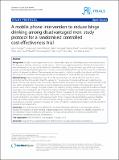A mobile phone intervention to reduce binge drinking among disadvantaged men : study protocol for a randomised controlled cost-effectiveness trial
Abstract
Socially disadvantaged men are at a substantially higher risk of developing alcohol-related problems. The frequency of heavy drinking in a single session is high among disadvantaged men. Brief alcohol interventions were developed for, and are usually delivered in, healthcare settings. The group who binge drink most frequently, young to middle-aged disadvantaged men, have less contact with health services and there is a need for an alternative method of intervention delivery. Text messaging has been used successfully to modify other adverse health behaviours. This study will test whether text messages can reduce the frequency of binge drinking by disadvantaged men.Methods/design: Disadvantaged men aged 25 to 44 years who drank >8 units of alcohol at least twice in the preceding month will be recruited from the community. Two recruitment strategies will be used: contacting men listed in primary care registers, and a community outreach method (time-space sampling). The intended sample of 798 men will be randomised to intervention or control, stratifying by recruitment method. The intervention group will receive a series of text messages designed to reduce the frequency of binge drinking through the formation of specific action plans. The control group will receive behaviourally neutral text messages intended to promote retention in the study. The primary outcome measure is the proportion of men consuming >8 units on at least three occasions in the previous 30 days. Secondary outcomes include total alcohol consumption and the frequency of consuming more than 16 units of alcohol in one session in the previous month. Process measures, developed during a previous feasibility study, will monitor engagement with the key behaviour change components of the intervention. The study will incorporate an economic evaluation comparing the costs of recruitment and intervention delivery with the benefits of reduced alcohol-related harm.
Citation
Crombie , I K , Irvine , L , Williams , B , Sniehotta , F F , Petrie , D , Evans , J M , Emslie , C , Jones , C , Ricketts , I W , Humphris , G M , Norrie , J , Rice , P & Slane , P W 2014 , ' A mobile phone intervention to reduce binge drinking among disadvantaged men : study protocol for a randomised controlled cost-effectiveness trial ' , Trials , vol. 15 , 494 . https://doi.org/10.1186/1745-6215-15-494
Publication
Trials
Status
Peer reviewed
ISSN
1745-6215Type
Journal article
Description
This project was funded by the UK National Institute for Health Research Public Health Research (NIHR PHR) programme (11/3050/30).Collections
Items in the St Andrews Research Repository are protected by copyright, with all rights reserved, unless otherwise indicated.

